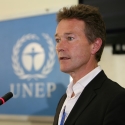UNEP and the Green Economy – Four Decades in Development
40 years ago in the Swedish capital city of Stockholm history was made at a UN conference on the future of humanity and the planet. Amid rising concern over pollution of the air, the land and the seas; the growing loss of species and the dying of forests as a result of acid rain, governments agreed that a UN body charged with coordinating a global response to such challenges should be established.

40 years ago in the Swedish capital city of Stockholm history was made at a UN conference on the future of humanity and the planet. Amid rising concern over pollution of the air, the land and the seas; the growing loss of species and the dying of forests as a result of acid rain, governments agreed that a UN body charged with coordinating a global response to such challenges should be established.
Between June 1972 and the UN General Assembly that year, many countries lobbied to have this new environmental body including Mexico, India, the United States and the UK. But in the end the East African country of Kenya won the diplomatic debate and in doing so became the first developing country to host a UN headquarters of what has become known as UNEP.
Two years later UNEP moved into its permanent premises in Nairobi on the site of an old coffee farm where it remains to this day employing around 1130 local and international staff and acting as a hub for a strategic network of regional offices in Bangkok, Panama City, Washington DC, Geneva and Bahrain.
An emphasis on science
UNEP was originally set up with modest aims -- to coordinate the rest of the UN system’s activities on environmental issues and to provide the science to member states on emerging trends in environmental change. The emphasis on science has perhaps been among UNEP’s most important contributions that in turn has led to governments negotiating key global treaties to address emerging environmental crises. The Montreal Protocol on Substances that Deplete the Ozone layer — the protective shield that filters out dangerous levels of the sun’s ultra violet rays—is a case in point.
It became clear in the 1980s that certain chemicals used in products such as fridges to fire-fighting equipment were attacking the ozone layer. By 2010, this UNEP treaty had coordinated the phase-out of over 100 of these harmful gases. Without the Montreal Protocol, atmospheric levels of ozone-depleting substances could have increased tenfold by 2050 which in turn could have led to up to 20 million more cases of skin cancer and 130 million more cases of eye cataracts, not to speak of damage to human immune systems, wildlife and agriculture.
UNEP along with the World Meteorological Organization also established the Intergovernmental Panel on Climate Change (IPCC). Its scientific work has become the premier risk assessment and reference work for governments on the likely trends and impacts of global warming and the Panel’s findings played a key role in the decision to establish the UN climate convention and its emission reduction treaty, the Kyoto Protocol.
Currently UNEP is convening negotiations towards the establishment of a global treaty on mercury -- a notorious heavy metal that damages the nervous system. The Mad Hatter in Alice in Wonderland was so called because hat makers once used mercury to strengthen the brims of hats and breathed in the fumes.
Following the famous Earth Summit of 1992, UNEP was given more opportunities to evolve its work as an implementing agency of a new multibillion-dollar fund, the Global Environment Facility.
Since 2008, the organization has been championing the Green Economy as a way of generating development and employment but in a way that keeps humanity’s footprint within ecological boundaries. Part of the Green Economy work has been to assess and communicate to governments the multi-trillion dollar services that nature provides, but which until recently have been all but invisible in national accounts of profit and loss.
Conferences make a difference
Often large UN conferences can seem to outsiders like talk fests and certainly assisting over 190 nations and to cooperate can sometimes prove frustrating. But often the real benefits, especially in respect to environmental action of what nations agree only emerge years or even decades later.
At the World Summit on Sustainable Development in Johannesburg in 2002, UNEP was asked to spearhead a partnership in order to accelerate a global phase-out of leaded petrol: Lead is especially damaging to the brain of infants and the young. Since then around 80 developing countries including Ghana, Kenya, Tanzania, South Africa, Vanuatu and several in the Caribbean have removed lead from transport fuels and only now are the enormous benefits emerging.
Scientists calculate that improvements in IQ, reductions in cardiovascular diseases, and decline in criminality are among the annual US$2.4 trillion benefits linked to ridding the world of leaded fuel. These economic benefits may prove to be even higher if other diseases and factors such as cancer and rising urbanization, where the impacts of lead pollution are higher, were brought into the calculations.
It is one example of how environmental measures and action also links directly to the social factors and issues of poverty, equity and livelihoods.
Important reforms
The 40th anniversary celebrations of UNEP conclude in December this year shortly after the closure of the UN’s General Assembly in New York which has been taking forward the outcomes of the Rio+20 Summit which took place in June this year.
As a result of the Rio+20 Summit which took place in Rio de Janeiro, governments agreed to strengthen and upgrade UNEP including via Universal membership and back an inclusive Green Economy as one important pathway towards realizing sustainable development. Four Decades after Stockholm, this represents a major reform and one which can strengthen and empower environment ministers across the globe. In doing so, Heads of State and government in Rio may have enabled a new force for a sustainable century and one able to better assist the world pursuing pathways to the Future We Want and the future we need.








